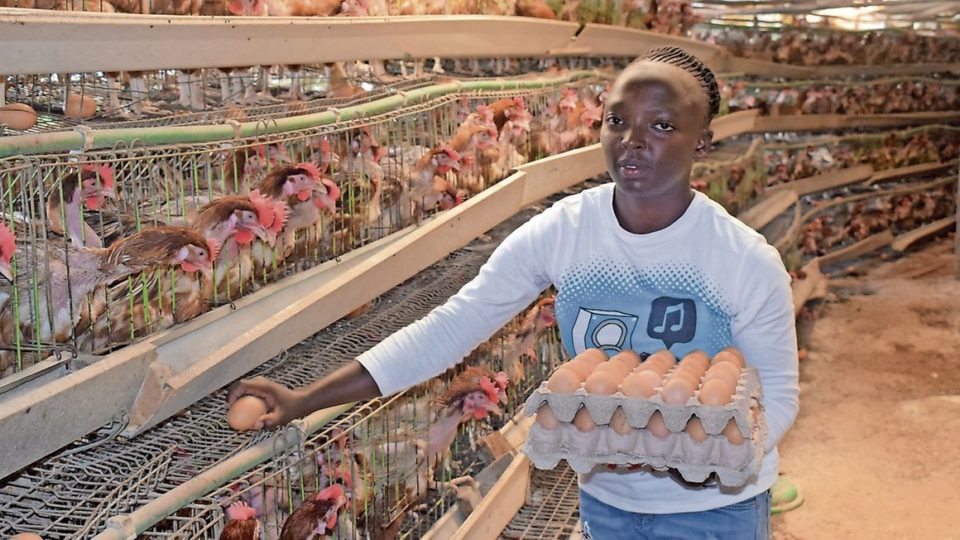Located in Ebuyangu, off the Kisumu-Busia highway in Vihiga County, Liam Farm is a vibrant poultry business owned by Dr Cleophas Ambira, a Nairobi-based banker.
It hosts 3,500 Kenbro chickens in battery cages, which offer them at least 60 trays of eggs per day. Elizabeth Ojina spoke to farm manager Sarah Maina,Dr Ambira and an agriculture expert.
For how long have you been keeping chickens and why this business?
Maina: The farm was started with 200 Kuroiler birds in 2017 due to the passion the owner had in keeping chickens.
Then it was a hobby, but Dr Ambira soon turned it into a business. He pumped in Sh200,000 that went into building the poultry house, buying feeds, feeders and drinkers.
With time, there was ready market for the birds and eggs. He then went into hatching the fertilised eggs and selling chicks but this failed due to poor management.
When you talk of poor management, what happened?
Maina: The main undoing was failure to properly regulate the incubator temperatures and humidity.
Most of the eggs failed to hatch, leading to the collapse of the project. They were two incubators with a capacity of 500 eggs each.
The farmer turned to broilers but things did not work out due to negative market perceptions. He then moved to layers for egg production, starting with 500 Isa Brown chicks that he bought from Kenchic at Sh115 each.
About 150 chicks died by the third day. I came to the farm when there were some 300 birds that were mature but had not started laying eggs. My main task was to turn around the farm.
Where did you start?
Maina: The first thing I did was to change the feeding regime, ensuring that the birds were offered 150g of layers mash a day.
You see, if you underfeed the birds, they will not start laying eggs on time or lay as required. They were being offered about 85g each a day.
We introduced the cage system in 2018 for easier management of layers and increased the number of birds steadily to 3,500.
This started in January 2019, when we brought in 1,000 birds, in July we added another 1,000 and the final batch of 1,000 came in January.
Some people say the battery cage system is not the best, what is your take?
Maina: In each cubicle of our battery cages, there are four birds. The cages are fitted with pipes to provide water.
The good thing is that the birds are easier to manage and control of diseases is much better.
There is also little wastage of feeds, which rarely get contaminated with the droppings and lastly, with the cage system, it is easier to collect eggs without breakage.
One of the negative aspects of the system, however, is that once in a while, the water nipples get damaged, thus spilling on the birds.
Cleaning the areas where droppings entangle can also be challenging.
Any challenges with diseases?
Maina: Yes, coccidiosis poses challenges now and then but we administer drugs.
We clean the water tanks every month and the feeding trays regularly to curb diseases.
Where do you sell your products?
Maina: We sell the eggs at Sh300 a tray to hotels in Vihiga, Siaya, Kakamega and Kisumu counties.
Before the Covid-19 pandemic, the market was stable, but the closure of hotels affected us.
Then there is also the problem of cheap Ugandan eggs, which disrupt the market, but things are picking up now.
The business has stabilised, what is your goal?
Dr Ambira: My target is to keep 10,000 layers. We don’t have large-scale egg producers in western, so the business potential is there.
We have started constructing a second poultry house that would host 3,500 chicks.
I am also working on adding value to the eggs and starting a hatchery.
How does poor feeding affect birds?
Prof Matthew Dida, Maseno University: Inadequate feeding deprives the birds of their potential to lay eggs.
On the other hand, adequate feeding of birds with nutrients will definitely boost egg production.
The feeds should be rich in calcium for the formation of egg shells and have carotene to boost the yellow york.


